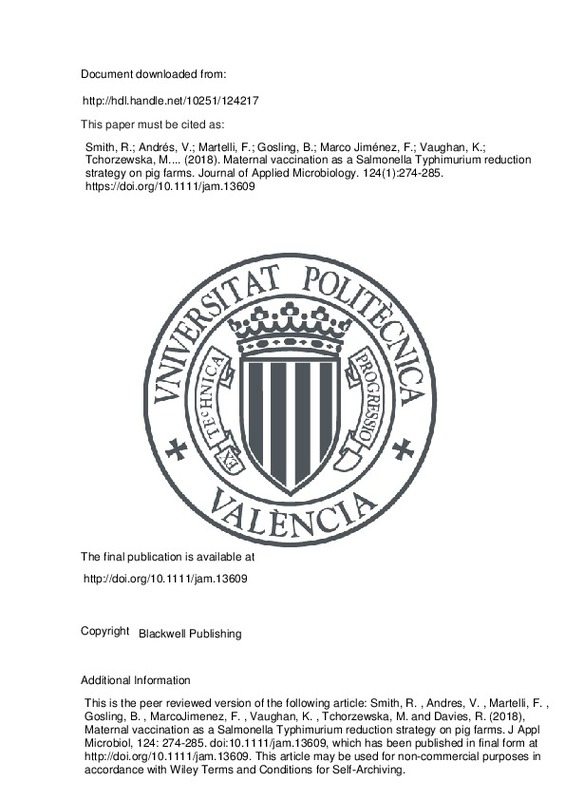Smith, R.; Andrés, V.; Martelli, F.; Gosling, B.; Marco Jiménez, F.; Vaughan, K.; Tchorzewska, M.... (2018). Maternal vaccination as a Salmonella Typhimurium reduction strategy on pig farms. Journal of Applied Microbiology. 124(1):274-285. https://doi.org/10.1111/jam.13609
Por favor, use este identificador para citar o enlazar este ítem: http://hdl.handle.net/10251/124217
|
Título:
|
Maternal vaccination as a Salmonella Typhimurium reduction strategy on pig farms
|
|
Autor:
|
Smith, R.P.
Andrés, V.
Martelli, F.
Gosling,B.

 Marco Jiménez, Francisco
Vaughan, Kelly
Tchorzewska, M.
Davies, R.
Marco Jiménez, Francisco
Vaughan, Kelly
Tchorzewska, M.
Davies, R.
|
|
Entidad UPV:
|
Universitat Politècnica de València. Departamento de Ciencia Animal - Departament de Ciència Animal
|
|
Fecha difusión:
|
|
|
Resumen:
|
[EN] AimsThe control of Salmonella in pig production is necessary for public and animal health, and vaccination was evaluated as a strategy to decrease pig prevalence.
Methods and ResultsThe study examined the efficacy ...[+]
[EN] AimsThe control of Salmonella in pig production is necessary for public and animal health, and vaccination was evaluated as a strategy to decrease pig prevalence.
Methods and ResultsThe study examined the efficacy of a live Salmonella Typhimurium vaccine, administered to sows on eight commercial farrow-to-finish herds experiencing clinical salmonellosis or Salmonella carriage associated with S. Typhimurium or its monophasic variants. Results of longitudinal Salmonella sampling were compared against eight similarly selected and studied control farms. At the last visit (similar to 14months after the start of vaccination), when all finishing stock had been born to vaccinated sows, both faecal shedding and environmental prevalence of Salmonella substantially declined on the majority of vaccinated farms in comparison to the controls. A higher proportion of vaccine farms resolved clinical salmonellosis than controls. However, Salmonella counts in positive faeces samples were similar between nonvaccinated and vaccinated herds.
ConclusionsThe results suggest that maternal vaccination is a suitable option for a Salmonella Typhimurium reduction strategy in farrow-to-finish pig herds.
Significance and Impact of the StudySalmonella vaccines have the potential to reduce the prevalence of Salmonella in pigs and result in a reduction of human cases attributed to pork.
[-]
|
|
Palabras clave:
|
Field study
,
Pig
,
Salmonella
,
Swine
,
Typhimurium
,
Vaccination
,
Vaccine
|
|
Derechos de uso:
|
Reserva de todos los derechos
|
|
Fuente:
|
Journal of Applied Microbiology. (issn:
1364-5072
)
|
|
DOI:
|
10.1111/jam.13609
|
|
Editorial:
|
Blackwell Publishing
|
|
Versión del editor:
|
http://doi.org/10.1111/jam.13609
|
|
Código del Proyecto:
|
info:eu-repo/grantAgreement/DEFRA//OZO344/
|
|
Descripción:
|
This is the peer reviewed version of the following article: Smith, R. , Andres, V. , Martelli, F. , Gosling, B. , Marco‐Jimenez, F. , Vaughan, K. , Tchorzewska, M. and Davies, R. (2018), Maternal vaccination as a Salmonella Typhimurium reduction strategy on pig farms. J Appl Microbiol, 124: 274-285. doi:10.1111/jam.13609, which has been published in final form at http://doi.org/10.1111/jam.13609. This article may be used for non-commercial purposes in accordance with Wiley Terms and Conditions for Self-Archiving.
|
|
Agradecimientos:
|
The authors thank the participating farmers and their vets involved in this study. The work was funded by the UK Department for Environment, Food and Rural Affairs (Defra) under project OZO344, and has been accomplished ...[+]
The authors thank the participating farmers and their vets involved in this study. The work was funded by the UK Department for Environment, Food and Rural Affairs (Defra) under project OZO344, and has been accomplished during the stay of Professor PhD. Francisco Marco-Jimenez in Animal and Plant Health Agency (APHA-Weybridge) with a grant of Conselleria de Educacion y Ciencia of Generalitat Valenciana. The authors also gratefully acknowledge IDT Biologika GmbH for supplying the vaccine and providing guidance on its use.
[-]
|
|
Tipo:
|
Artículo
|







![[Cerrado]](/themes/UPV/images/candado.png)


